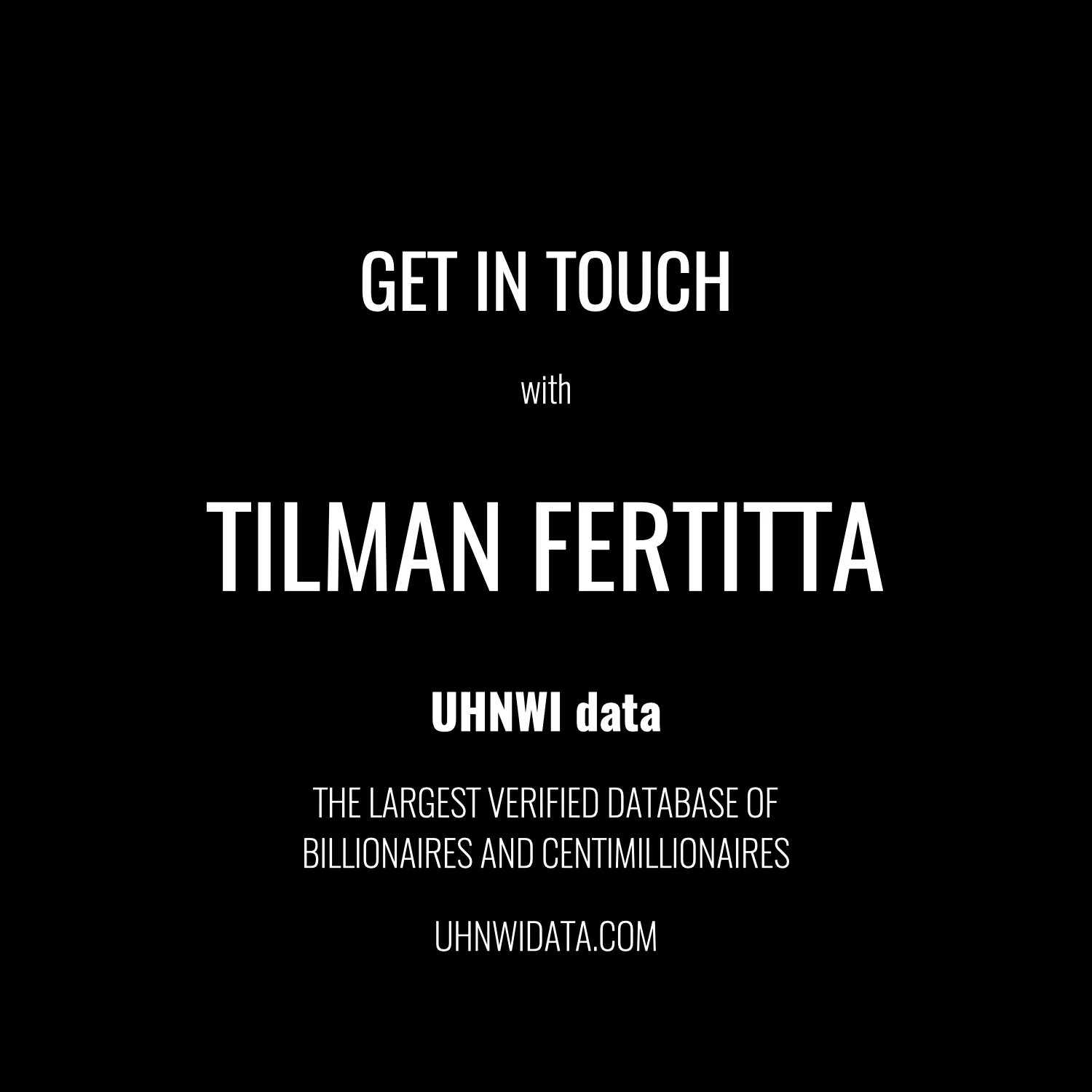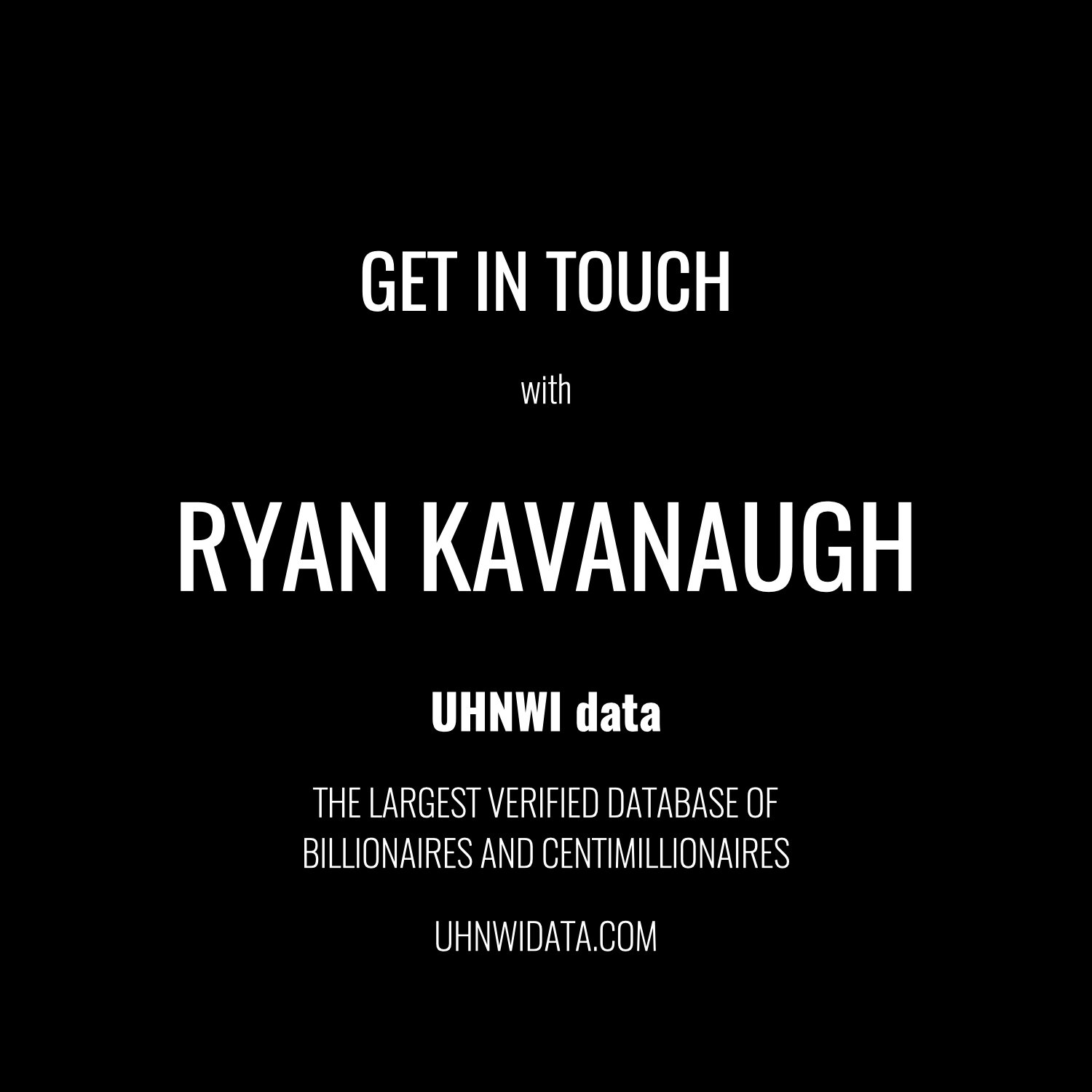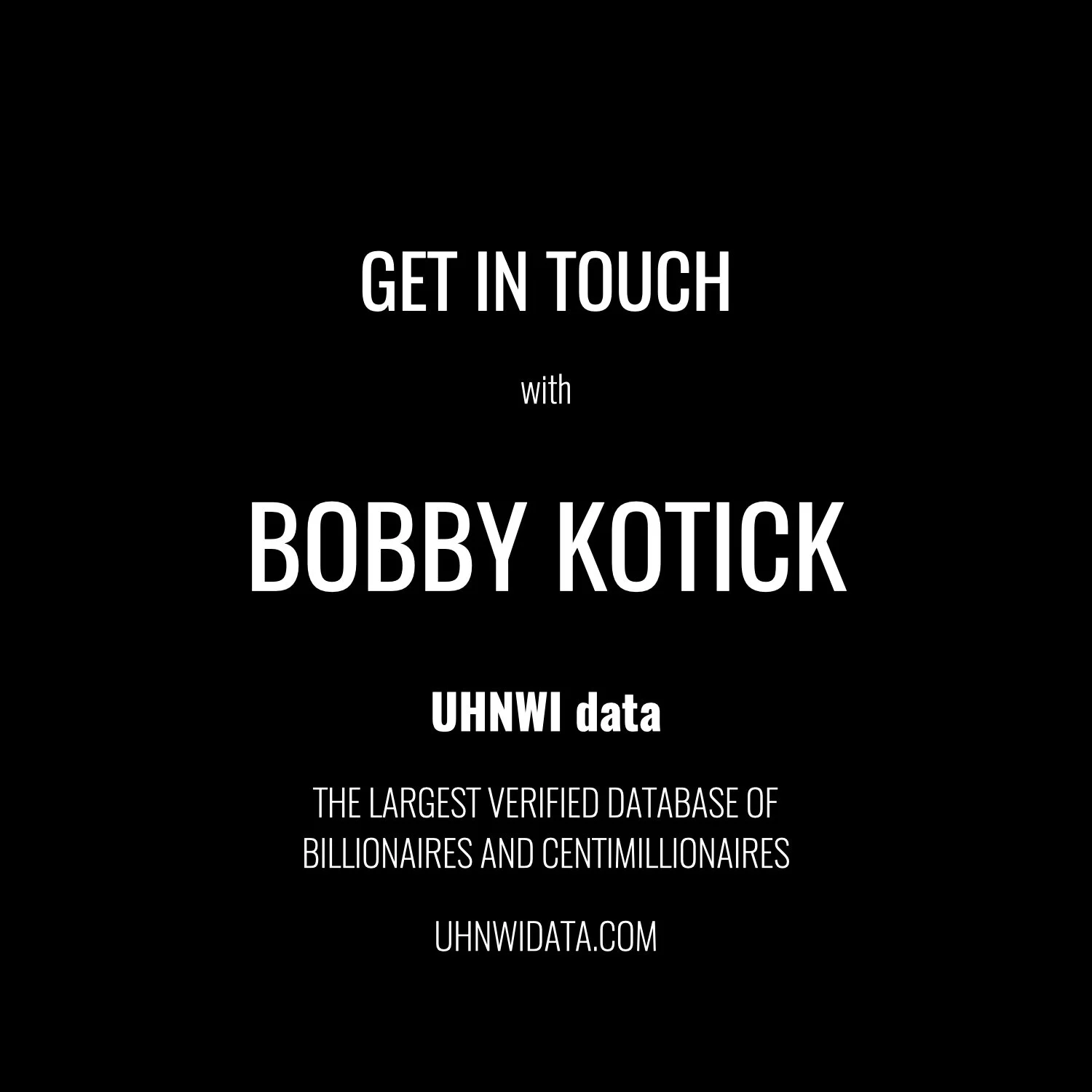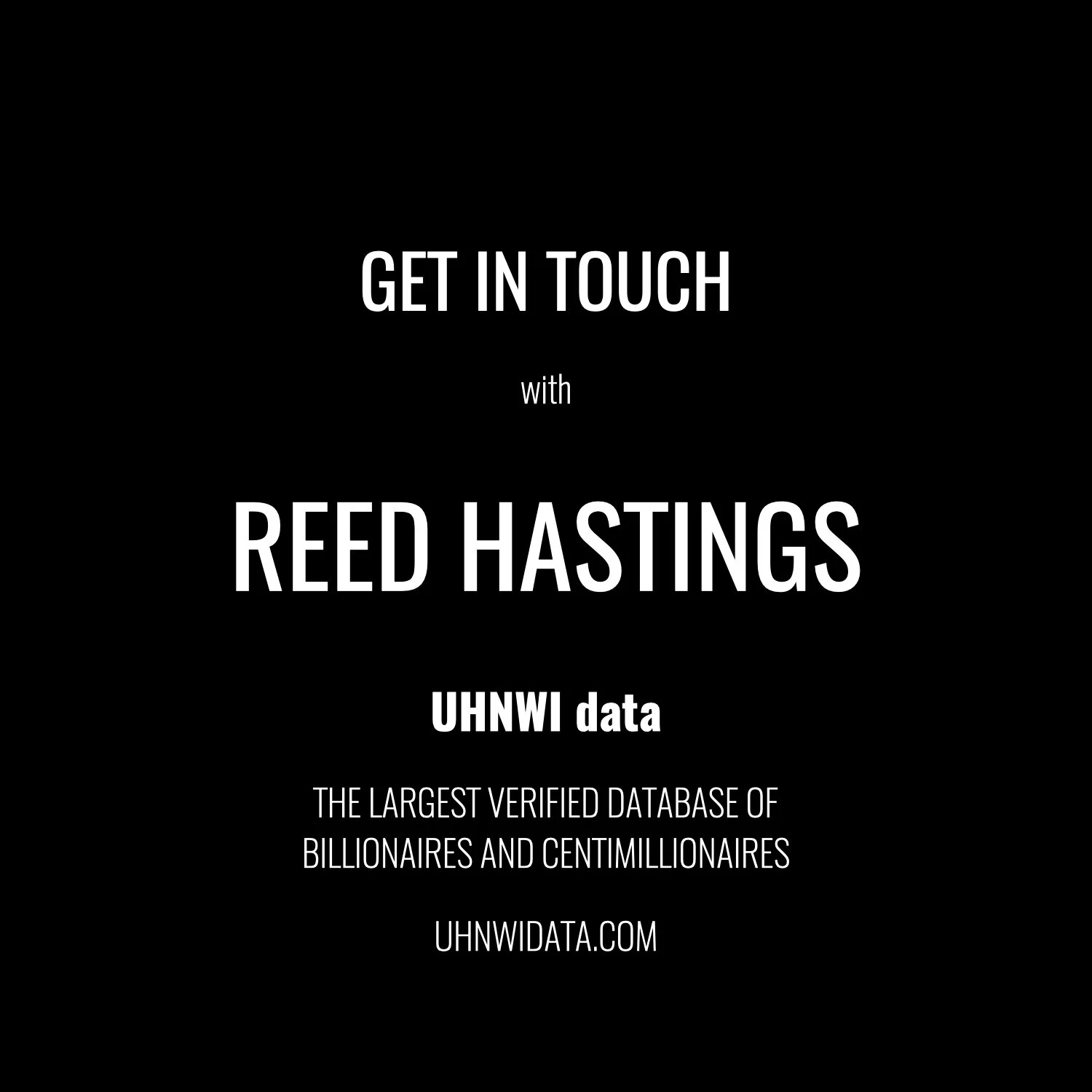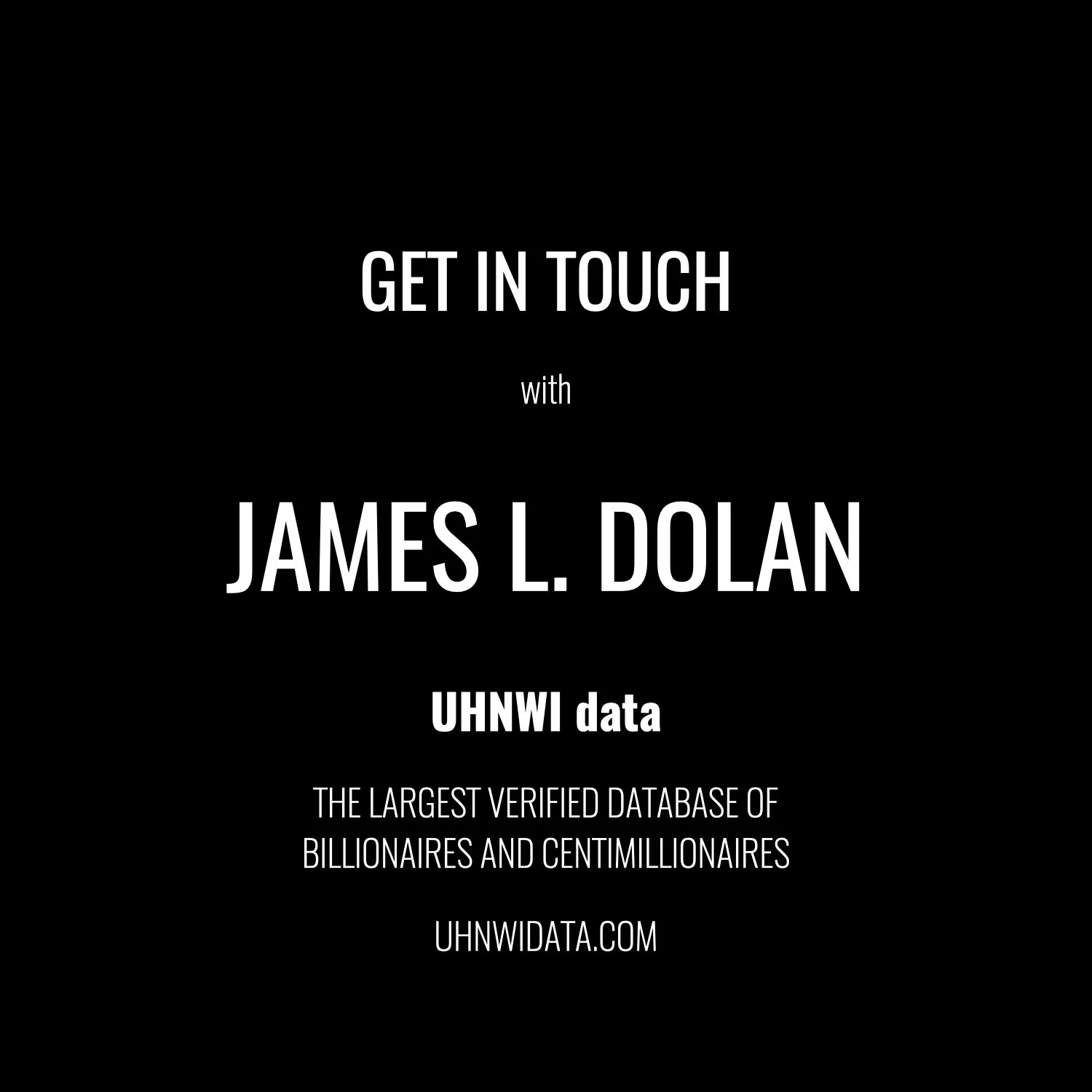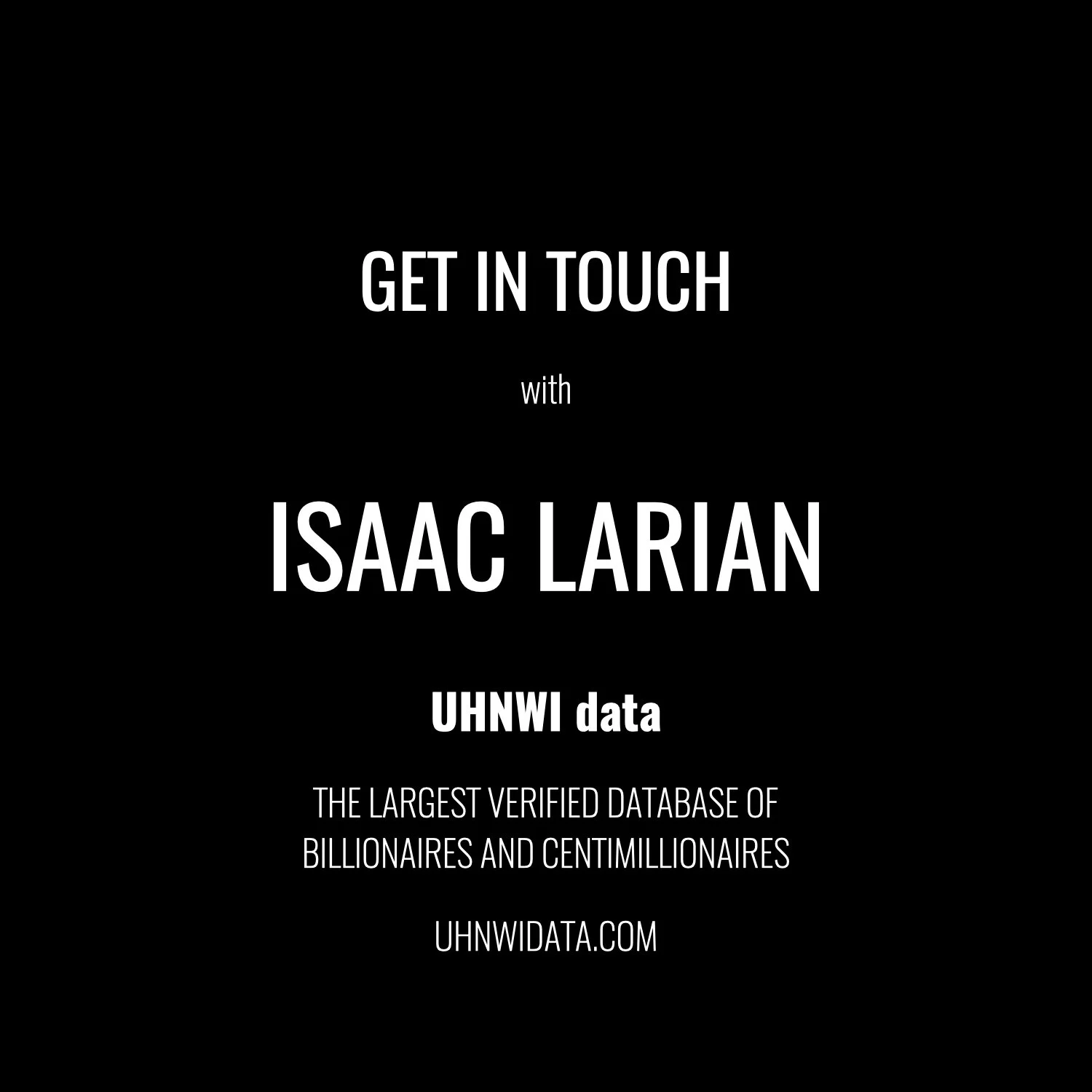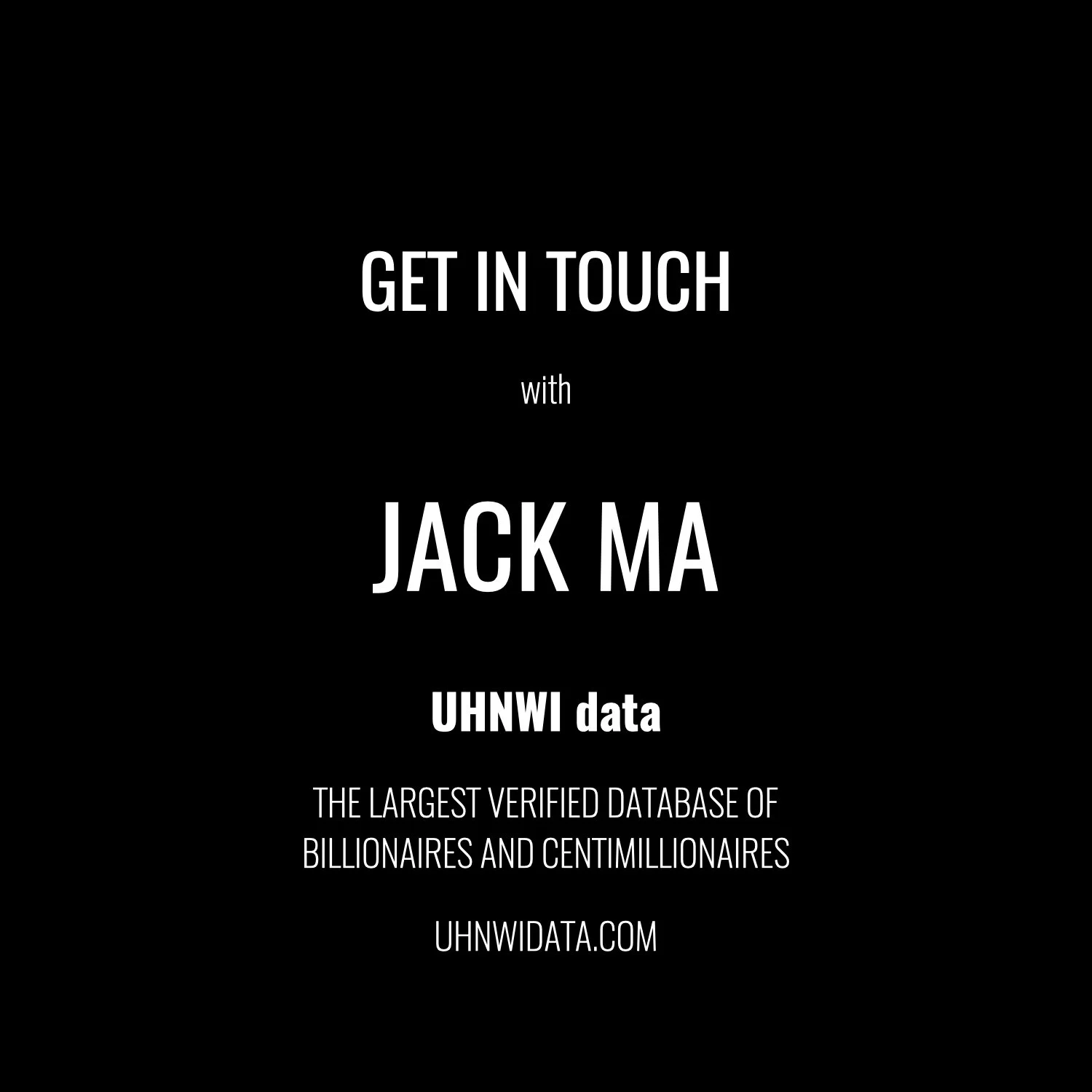James Lawrence Dolan (born May 11, 1955) is an American businessman who serves as executive chairman and chief executive officer of both Madison Square Garden Sports Corp. and Madison Square Garden Entertainment Corp.[1][2]
The son of Charles Dolan, founder of Cablevision Systems Corp. and Home Box Office, James Dolan joined the family business early in his career, rising to become chief executive officer of Cablevision from 1995 until its sale to Altice in 2016.[1][2] In his current roles, he directs operations for professional sports franchises including the National Basketball Association's New York Knicks and the National Hockey League's New York Rangers, as well as entertainment assets like Madison Square Garden arena and the Sphere venue in Las Vegas.[1][2] Dolan has overseen significant infrastructure investments, including a $1 billion renovation of Madison Square Garden completed in 2013 and restorations of historic sites such as Radio City Music Hall, the Beacon Theatre, and the Forum in Inglewood, California.[2][3] Outside business, he performs as a musician and frontman for the roots rock band JD & the Straight Shot.[2] His net worth is estimated at approximately $2 billion as of 2025.[4]
Dolan's executive decisions have drawn both acclaim for expanding MSG's portfolio into high-profile entertainment and criticism for erratic sports management, particularly with the Knicks, whose prolonged playoff droughts have fueled fan discontent despite recent improvements.[5] Controversies include the use of facial recognition technology at MSG venues to exclude individuals involved in litigation against his companies and personal lawsuits alleging sexual misconduct, which Dolan and his representatives have denied as baseless.[6][7][8] These episodes reflect a combative approach to oversight, prioritizing control over public relations amid systemic media scrutiny often amplified by institutional biases against high-profile business figures.
Early Life and Education
Family Background and Upbringing
James L. Dolan was born on May 11, 1955, in Massapequa, New York, the eldest son among six children of Charles F. Dolan and Helen Ann (née Schaffer) Dolan.[9][10] His siblings include Kathleen M. Dolan, Marianne Dolan Weber, Patrick Dolan, Thomas Dolan, and another sister.[9] The family resided in the suburban community of Massapequa on Long Island, where Dolan grew up during the early expansion of his father's ventures in cable television.[11][4]
Charles Dolan, an entrepreneur of Irish Catholic descent born in Cleveland, Ohio, in 1926 to inventor David Dolan, had begun building a media business by the 1960s, launching services like Teleguide in 1961 and Sterling Manhattan Cable in 1965 before founding Home Box Office in 1972 and Cablevision Systems in 1973.[12][13] This timing placed the family's rising affluence amid James Dolan's childhood and adolescence, providing a backdrop of entrepreneurial ambition and financial security rather than inherited wealth from prior generations.[10] Dolan is also the nephew of Larry Dolan, longtime owner of the Cleveland Guardians baseball franchise.[14] Details of his personal upbringing remain limited in public records, with no notable accounts of unusual hardships or formative non-business influences, reflecting a stable, middle-class suburban environment that transitioned into involvement in the family enterprise.[11]
Academic and Early Influences
James L. Dolan attended Cold Spring Harbor High School in New York, where he was active in the school music choir and earned recognition as the best vocalist.[11] During this period, he developed an early passion for music, beginning to play instruments around age 16 in 1971, amid the era's rock influences including bands like the Allman Brothers and Grateful Dead.[15]
Dolan enrolled at the State University of New York at New Paltz, initially pursuing music before switching to a communications major.[9] He graduated in 1979 with a Bachelor of Science in communications, a field aligning with his family's media enterprises.[16] Academic records indicate he was not an exemplary student but completed his degree amid part-time work in the industry.[17]
Early influences centered on music as a primary aspiration, with Dolan forming bands and drawing from blues-rock artists, yet familial exposure to his father Charles Dolan's ventures in cable television—founding Cablevision and HBO—steered him toward business applications of communications.[9] This blend of creative interests and pragmatic family legacy shaped his transition post-graduation into operational roles at Cablevision, prioritizing media infrastructure over pure artistic pursuits.[11]
Business Career
Entry into Cablevision and Family Enterprises
James L. Dolan, eldest son of Charles F. Dolan, entered the family business by joining Cablevision Systems Corporation in the 1970s shortly after completing his education in communications at the State University of New York at New Paltz.[2][18] Cablevision, founded by Charles Dolan in 1973 as a cable television provider targeting the New York suburbs and later expanding into the metropolitan area, represented the core of the family's media and telecommunications enterprises.[19][20] Dolan's initial involvement aligned with the company's growth phase, during which it developed broadband and programming services under family oversight.
In his early tenure, Dolan assumed various executive roles at Cablevision, building operational expertise in cable distribution and content delivery.[2] These positions involved contributions to the company's infrastructure and strategic planning, reflecting the hands-on approach typical in second-generation family management of closely held firms.[21] By the late 1980s and early 1990s, he transitioned toward oversight of Rainbow Media Holdings, a key subsidiary focused on programming that encompassed regional sports networks and entertainment channels, thereby deepening his engagement with the family's diversified media assets.[2][22]
This progression within Cablevision and its affiliates exemplified the Dolan family's strategy of internal succession, leveraging generational continuity to navigate competitive pressures in the cable industry, including franchising disputes and technological shifts toward bundled services.[23][24] Dolan's entry facilitated the integration of sports and entertainment ventures, such as Madison Square Garden properties, into the broader enterprise portfolio.[25]
Ascension to MSG Leadership
In 1995, James L. Dolan succeeded his father, Charles F. Dolan, as chief executive officer of Cablevision Systems Corporation, the parent company that controlled Madison Square Garden operations, including its sports franchises and entertainment venues.[2] Under his leadership at Cablevision, Dolan oversaw strategic decisions affecting MSG assets, such as programming for MSG Networks, which he had helped develop earlier in his career. This positioned him to drive the eventual separation of MSG from Cablevision's core telecommunications business.[26]
On July 30, 2009, Cablevision announced plans to spin off its MSG unit into an independent public company, a move completed on February 9, 2010, to allow focused growth in sports, entertainment, and media separate from declining cable TV revenues. As part of the restructuring, James L. Dolan was appointed executive chairman of the new Madison Square Garden, Inc., while retaining his CEO role at Cablevision; Hank J. Ratner was named president and CEO of MSG to handle day-to-day operations.[27] [28] This ascension marked Dolan's direct oversight of MSG's governance, with the Dolan family retaining significant control through Class B shares that provided supermajority voting power.[29]
Following Cablevision's sale to Altice in June 2016, Dolan intensified his focus on MSG, assuming additional executive roles amid further corporate reorganizations. He served as executive chairman of MSG Networks from 2009 to 2021 and became CEO of MSG Sports in November 2017, consolidating authority over the Knicks and Rangers.[30] By December 2022, after MSG Entertainment's spin-off of Sphere Entertainment, Dolan held the titles of executive chairman and CEO for both MSG Sports and MSG Entertainment, solidifying his long-term leadership of the restructured entities.[31]
Expansion into Sphere Entertainment and Recent Financial Maneuvers
In April 2023, Madison Square Garden Entertainment Corp., under James L. Dolan's leadership as executive chairman, completed a tax-free spin-off of its traditional live entertainment businesses—including Madison Square Garden arena, The Chicago Theatre, and other regional venues—into a separate entity renamed Madison Square Garden Entertainment Corp., with the parent company rebranded as Sphere Entertainment Co. to concentrate on innovative immersive entertainment projects like the Las Vegas Sphere venue.[32][33] The distribution occurred on April 20, 2023, to shareholders of record as of April 14, 2023, allowing Sphere Entertainment to isolate its high-risk development of next-generation venues from the more stable arena operations.[34]
Dolan, serving as executive chairman and CEO of Sphere Entertainment, oversaw the September 2023 opening of the flagship Sphere in Las Vegas, a $2.3 billion spherical venue featuring advanced LED interiors, immersive audio, and haptic seating for concerts, films, and events, marking a pivot toward proprietary technology-driven experiences rather than conventional arenas.[25] In early 2025, Dolan announced plans to expand the Sphere model globally through smaller, more cost-effective venues seating approximately 5,000 patrons, targeting mid-sized markets to accelerate deployment and reduce construction timelines compared to the 17,000-capacity Las Vegas original.[35][36] These "mini-Spheres" aim to leverage the same immersive tech for broader franchising, with Dolan emphasizing refined scheduling and pricing at the Las Vegas site to optimize revenue amid ongoing operational scaling.[37]
Financially, Sphere Entertainment reported over $500 million in operating losses for its first full year post-opening in 2023-2024, attributed to initial ramp-up costs and venue maturation, which Dolan likened to imperfect early production in manufacturing.[38] The Sphere Experience segment generated an estimated $333 million in revenue in the prior year, nearly double the $188 million from MSG Networks, though the latter faces $829 million in debt maturing amid cord-cutting pressures, prompting restructuring discussions as of February 2025.[39][40] Sphere's stock rose 50% in the month leading to September 2025 and 155% from April, fueled by high-profile residencies like a reimagined The Wizard of Oz, signaling investor optimism in Dolan's vision despite persistent losses.[39]
Sports Franchise Oversight
New York Knicks Management
James L. Dolan assumed control of the New York Knicks' parent company, Madison Square Garden, as chairman in 1999, following the Dolan family's acquisition of the franchise through Cablevision in 1994. Under his leadership as executive chairman of Madison Square Garden Sports Corp., the Knicks have maintained operational control through a series of basketball executives, with Dolan retaining final decision-making authority on major hires, firings, and strategies. The team's on-court performance has been marked by consistent underachievement, compiling a winning percentage below .500 across his tenure, including a 304-games-under-.500 record through the 2021-22 season—the worst in the NBA during that period. No championships have been won, and deep playoff runs have been rare, with the franchise reaching the NBA Finals only once in 2000 before exiting in five games.[41]
Dolan's management has featured high executive turnover and controversial personnel decisions. He hired Isiah Thomas as team president in 2003, a tenure ending in 2008 amid scandals, lawsuits over workplace issues, and poor results, including a 19-63 record in 2007-08. In 2014, Dolan appointed Phil Jackson as president with a five-year, $60 million contract to implement the triangle offense, but Jackson's draft picks like Kristaps Porziņģis succeeded initially while trades and coaching choices faltered, leading to Jackson's firing in 2017 after a 113-loss season. Subsequent leaders included Steve Mills and, from 2020, Leon Rose as president, who prioritized free-agent signings like Jalen Brunson and trades for Julius Randle, yielding playoff berths in 2023 and 2024 but no conference finals advancement. Tom Thibodeau, hired as head coach in 2020, delivered the Knicks' first three consecutive postseason appearances since 2000-01, improving from a 182-games-under-.500 stretch pre-hiring to 50-win seasons in 2023-24 and 2024-25, yet Dolan spearheaded his dismissal in June 2025, citing perceived tactical shortcomings despite Thibodeau's status as the most successful coach in decades.[42][43][5][44]
Critics, including fans and analysts, attribute the Knicks' mediocrity to Dolan's interventionist style, such as undermining general managers like Donnie Walsh and prioritizing short-term moves over sustainable rebuilding, which has fueled chants of "sell the team" at games. Dolan has faced lawsuits from ejected fans, including a 2022 facial-recognition ban case settled after appeals, and public spats with media over coverage. Defenders highlight business metrics: the Knicks' franchise value escalated from under $300 million near 1999 to $7.5 billion by 2025, driven by New York market dominance, ticket revenue, and control of MSG Networks, generating profits even amid losing seasons. Dolan has countered performance critiques by emphasizing financial transparency demands from the NBA and revenue-sharing disputes, arguing that league policies subsidize poorer teams at the expense of high-revenue franchises like the Knicks.[43][45][46][47]
New York Rangers and Liberty Operations
James L. Dolan has served as Executive Chairman of Madison Square Garden Sports Corp., the entity controlling the New York Rangers of the National Hockey League (NHL), since assuming the role of MSG Chairman in 1999 following Cablevision's 1994 acquisition of the team and arena.[1][48] Under his oversight, the Rangers have maintained a high payroll, often ranking among the league's top spenders, while transitioning from a period of playoff absences in the early 2010s to consistent contention.[49] The team endured seven consecutive non-playoff seasons from 2010 to 2017 despite elevated spending, prompting a deliberate rebuild that emphasized draft picks, prospect development, and cap management rather than short-term rentals.[49][50]
Dolan has delegated day-to-day hockey operations to executives such as longtime president Glen Sather, who retired in June 2024 after 24 years, and current president and general manager Chris Drury, whose multi-year contract extension was announced in April 2025.[51][52] Key decisions include the 2018 firing of head coach Alain Vigneault after a first-round playoff exit and the May 2025 hiring of Mike Sullivan as head coach following a disappointing 2024-25 postseason.[53][54] Performance highlights encompass Presidents' Trophy wins in 2013 and 2015 for the league's best regular-season record, along with Eastern Conference Finals appearances in 2012, 2014, 2022, and 2024, though the franchise has not advanced to the Stanley Cup Final since its 1994 victory, predating Dolan's increased involvement.[55][56] This track record reflects a more restrained approach compared to Dolan's basketball operations, with analysts crediting his willingness to empower hockey personnel for fostering long-term stability.[55][49]
Dolan owned the New York Liberty of the Women's National Basketball Association (WNBA) from the franchise's inception as one of the league's eight original teams in 1997 until its sale to Joseph Tsai and Clara Wu Tsai in 2019 for an estimated $10-14 million.[57][58] During this period, the Liberty qualified for the playoffs in 17 of 22 seasons, reaching the Finals in 1999 and 2000 but failing to secure a championship, with the team ultimately winning its first title in 2024 under new ownership.[59] In November 2017, Dolan announced plans to divest the franchise amid MSG's corporate restructuring, temporarily retaining it in February 2018 before completing the transaction.[60][61] Operations included relocating home games from Madison Square Garden to the Westchester County Center in White Plains, New York, starting in 2018, a move attributed to cost efficiencies and reduced priority amid the sale process.[62] Dolan cited pride in the WNBA's growth during his tenure as an original owner.[63]
Key Achievements and Valuation Growth
Under James Dolan's oversight as executive chairman of Madison Square Garden Sports Corp., the New York Knicks and New York Rangers have achieved significant financial milestones, including consistent revenue growth from premium ticketing, controlled media rights through MSG Networks, and strategic asset management that has insulated the franchises from league-wide broadcasting disruptions.[64] These efforts have contributed to the teams maintaining high operating incomes relative to peers, with the Knicks generating an estimated $522 million in revenue for the 2024-25 season and the Rangers $301 million, supporting reinvestments in facilities and operations.[65][66]
Franchise valuations have expanded dramatically since the 1997 acquisitions by entities under Dolan's family influence, reflecting New York market dynamics, arena ownership synergies, and avoidance of revenue-sharing pitfalls in national media deals. The Knicks, purchased for $300 million, reached a Forbes-estimated value of $9.75 billion by October 2025, representing a more than 32-fold increase.[65] Similarly, the Rangers, acquired for $195 million, were valued at $3.5 billion as of December 2024, underscoring a nearly 18-fold growth driven by sustained attendance and playoff contention.[66] Over the prior five years alone, Knicks valuation rose 81% while the Rangers' more than doubled, outpacing some league averages amid broader sports asset appreciation.[67]
For the New York Liberty, Dolan's pre-2019 stewardship included foundational investments in WNBA operations, yielding steady attendance at Barclays Center before the 2019 sale to Joe Tsai for approximately $10-14 million; subsequent valuations under new ownership highlight the platform's inherent growth potential from Dolan-era infrastructure, though direct attribution post-sale is limited. Key operational achievements across franchises include the Rangers' multiple Presidents' Trophy wins (2012, 2013, 2024) and Eastern Conference Finals appearances, bolstering brand equity without relying on championships, which have eluded all three teams during his tenure.[66] This financial model has positioned MSG Sports as a high-margin entity, trading at an enterprise value below sum-of-parts estimates despite activist calls for spinoffs to unlock further gains.[68]
Operational Controversies and Defenses
Dolan's oversight of the New York Knicks has drawn criticism for operational decisions perceived as meddlesome, including the 2005 hiring of Isiah Thomas as team president despite his lack of executive experience, which led to a series of poor contracts such as the five-year, $30 million deal for Jerome James in 2005 and the extension of Allan Houston's contract that burdened the salary cap due to injury provisions.[69] These moves contributed to a 92-loss season in 2005-2006 and a league-record $100 million luxury tax payment in 2006-2007, exacerbating perceptions of fiscal irresponsibility.[69] Critics, including former general manager Donnie Walsh, have accused Dolan of undermining autonomy by overriding personnel choices, such as blocking trades and hires during Walsh's tenure from 2008 to 2011.[69]
Fan relations have fueled operational disputes, notably the February 22, 2017, ejection and arrest of Knicks legend Charles Oakley at Madison Square Garden during a game against the Clippers, where security removed him after an altercation near Dolan's courtside seat; Oakley filed suit alleging excessive force and Dolan's personal animus, claiming Dolan refused basic courtesies like eye contact or a handshake in prior encounters.[70] Dolan defended the action as a security response to Oakley's disruptive behavior, noting in a 2018 ESPN interview that Oakley demanded complimentary tickets he was not entitled to and had a history of confrontations, while emphasizing MSG's protocols for handling aggressive individuals regardless of celebrity status.[71]
Implementation of facial recognition technology at MSG since 2018 has sparked lawsuits over operational access policies, with Dolan authorizing bans on over 1,000 attorneys from firms suing MSG Entertainment, extending to Knicks and Rangers games; a 2023 federal judge criticized the policy as "the stupidest thing ever" for its retaliatory nature, though it remained in place.[72] A September 2025 lawsuit accused MSG of spying on fans chanting "sell the team" and a transgender attendee via surveillance, alleging firings of executives who objected to privacy violations.[73] Dolan has justified these measures as essential for venue security and protecting against litigation threats, arguing in public statements that they prevent disruptions and safeguard operational integrity amid New York's competitive media market monopoly.[74]
In defense, Dolan has maintained distance from daily basketball operations since hiring Leon Rose as Knicks president in 2020, crediting this delegation for recent stability and playoff appearances, including the 2024 Eastern Conference semifinals and a 2025 run nearing the NBA Finals.[5] [75] He has countered meddling accusations by noting consistent revenue growth—Knicks valuation rose from $1.5 billion in 2015 to over $6 billion by 2025—and arguing that criticism persists despite wins due to fan entitlement in a high-profile market.[76] For the Rangers, operational controversies are fewer, with Dolan defending rebuild strategies post-2018 that yielded playoff contention, attributing fan impatience to unrealistic expectations rather than mismanagement.[77]
Media and Broadcasting Ventures
MSG Networks Development
MSG Networks, originally launched in 1969 as the first regional sports network in the United States with a New York Rangers game, saw key operational advancements under James L. Dolan's oversight following his ascension to CEO of parent company Cablevision Systems Corporation in 1995.[78] During this period, the network expanded its technological capabilities, notably becoming the first to provide regular high-definition sports coverage in 1998 by producing all New York Knicks and Rangers home games in HD format.[79] This innovation aligned with broader industry shifts toward enhanced viewing quality and supported growing subscriber bases through Cablevision's distribution infrastructure.
In 2010, Dolan spearheaded the spin-off of the Madison Square Garden assets, including MSG Networks, Knicks, and Rangers franchises, from Cablevision into the independent Madison Square Garden Company, where he assumed the role of executive chairman; this restructuring aimed to unlock value by separating high-growth sports and entertainment assets from Cablevision's core telecommunications operations.[80] The move allowed focused investment in content production and distribution, with MSG Networks benefiting from dedicated management. Dolan directly led MSG Networks as president and chief executive officer before transitioning to executive chairman in June 2009, a position he held until July 2021.[81]
A further pivotal development occurred on September 30, 2015, when the Madison Square Garden Company divided into two entities: Madison Square Garden Sports Corp. for the franchises and arena operations, and the remaining company retaining MSG Networks for regional broadcasting; Dolan retained executive oversight across both, enabling MSG Networks to license content rights from the sports entity while pursuing independent carriage deals and digital expansions.[26] Under this structure, the network grew revenues to a record $887 million in the fiscal year ending June 2023, yielding $89.9 million in profit, driven by premium carriage fees despite emerging cord-cutting pressures.[82] These maneuvers reflected Dolan's strategy of leveraging exclusive local sports rights for financial leverage in an evolving media landscape.
Policy Implementations on Access and Coverage
Under James Dolan's leadership, MSG Networks has maintained a policy of territorial exclusivity for New York Knicks and Rangers game coverage, prioritizing regional sports network (RSN) carriage agreements with cable providers to fund local production and rights payments. This approach enforces strict geo-restrictions, blacking out games for viewers outside the designated New York metropolitan territory, as defined by NBA and NHL agreements, to preserve exclusive broadcast rights and affiliate fees. For instance, MSG's streaming service, MSG GO (relaunched as MSG+ in 2023), requires users to enable location services on mobile devices and verifies IP addresses to ensure access only for in-market subscribers, explicitly prohibiting out-of-market streaming to avoid violating league territorial rules.[83][84]
To address cord-cutting trends, Dolan oversaw the introduction of a direct-to-consumer (DTC) streaming app in November 2022, allowing local fans without traditional cable to subscribe for Knicks and Rangers games at $29.99 monthly or $279.99 annually via the Gotham Sports app, integrated with MSG content. This initiative aimed to expand access for approximately 2.1 million potential in-territory viewers while adhering to blackout policies, with Dolan expressing confidence in 2023 that it would help MSG "regain the business" amid declining cable subscriptions. However, the service remains geo-fenced, directing out-of-market fans to national platforms like ESPN+ or league passes, which themselves impose local blackouts.[85][86][87]
Carriage disputes have periodically disrupted access, reflecting Dolan's firm stance on securing higher affiliate fees to sustain operations. A notable example occurred on January 1, 2025, when MSG Networks went dark for over 1 million Optimum (Altice USA) subscribers due to failed renewal talks over escalating fees, blacking out Knicks and Rangers games until a resolution on February 22, 2025. During the standoff, MSG urged affected customers to switch to competitors like Verizon Fios, emphasizing consumer choice over concessions, while Altice accused Dolan of bad-faith negotiations amid MSG's $829 million debt load. Similar blackouts, such as a 48-day dispute with Time Warner Cable in 2010, underscore the policy's emphasis on revenue protection, even at the cost of temporary fan access denial.[88][89][90]
Dolan has defended these access limitations as essential to the RSN model, criticizing broader national streaming expansions in a July 2024 letter to NBA governors for eroding local rights through blackout clauses and reduced revenue sharing. He argued that the NBA's shift away from RSNs—exemplified by its $74.6 billion media deal—undermines teams' ability to invest in coverage, positioning MSG's policies as a bulwark against dilution of territorial value. In April 2025, amid financial pressures, MSG implemented cuts to media rights fees paid to the Knicks and Rangers, signaling adjustments to coverage sustainability without altering core access restrictions.[91][92][93]
Conflicts with NBA Media Rights and Revenue Sharing
In July 2024, James Dolan, executive chairman of Madison Square Garden Sports Corp., sent a letter to the NBA's Board of Governors criticizing the league's proposed 11-year, $76 billion media rights deal with ESPN, NBCUniversal, and Amazon, arguing that it undermines the viability of regional sports networks (RSNs) by increasing national exclusivity and non-exclusivity of games, which erodes local broadcasting revenue.[45][94] Dolan contended that the deal allows national partners to air nearly all Knicks games, reducing MSG Networks' carriage fees and subscriber base, as the network relies on local rights for Knicks telecasts.[45] He further objected to the NBA retaining an 8% share of the media revenue—approximately $6 billion over the term—without adequate justification, describing it as an overreach that disadvantages teams investing in high-value local markets like New York.[95][96]
Dolan's opposition stems partly from his ownership of MSG Networks, which holds Knicks local broadcast rights and faces existential threats from streaming-centric national deals that prioritize broad access over regional exclusivity.[97] In the letter, he accused the NBA of pursuing a strategy to "disrupt" RSN models, potentially forcing teams like the Knicks into financial dependency on league-distributed funds rather than self-generated local income.[96] This critique aligns with Dolan's long-standing resistance to NBA revenue sharing policies, which redistribute approximately 50% of national media revenue and portions of local revenues (such as ticket sales and sponsorships) from high-performing franchises to smaller-market teams, a system he has viewed as penalizing success and fostering complacency since its expansion under former Commissioner David Stern.[45][97]
By September 2024, Dolan's dissent escalated when he withheld support for the NBA's 2024-25 operating budget, citing unresolved concerns over revenue sharing's disproportionate burdens on big-market owners and the media deal's streaming emphasis, which he argued devalues RSNs without compensating affected parties adequately.[98] Despite his vocal stance, the media deal was ratified by the Board of Governors on July 16, 2024, highlighting Dolan's minority position among owners, though he has garnered sympathy from other large-market executives wary of RSN declines amid cord-cutting trends.[94] Dolan's advocacy reflects broader tensions between local media autonomy and the NBA's push for national scalability, with MSG Networks' financial health—tied to Knicks viewership—directly at stake, as the network reported operating losses in recent quarters amid industry shifts.[99]
Philanthropic Contributions
Garden of Dreams Foundation Initiatives
The Garden of Dreams Foundation, a nonprofit organization partnered with Madison Square Garden entities, focuses on delivering educational, inspirational, and experiential opportunities to youth facing adversity, including those in foster care, hospitals, or underserved communities.[100] Established in 1997 and restructured under its current name in 2006, the foundation has impacted over 440,000 young people and their families through targeted programs emphasizing grants, mentorship, and events.[100] [101] James L. Dolan serves as vice chairman, leveraging MSG Sports and Entertainment resources to amplify initiatives such as athlete meet-and-greets and venue access.[102]
Key educational initiatives include the Inspire Scholarship Program, launched in 2015, which awards up to 20 scholarships annually to high school seniors or first-year undergraduates affiliated with foundation partners, providing $60,000 per recipient usable over four years for college or trade school tuition and related expenses.[103] Since inception, this program has committed nearly $7 million to support student success in higher education or vocational training.[103] Complementary efforts encompass mentorship and career exposure, partnering with organizations to offer guidance from professionals in sports, entertainment, and related fields, alongside skill-building in areas like basketball, hockey, and dance.[104]
Grant-making forms a core pillar, with the foundation distributing $6.88 million in grants during fiscal year 2024 to partner nonprofits addressing youth needs in health, education, and welfare.[105] Community events and "moments of joy" initiatives provide ticket donations to MSG events and curated experiences, such as hospital visits by team mascots or performers, fostering inspiration amid challenges.[100] The annual Back to School program, active since 2015, has supplied backpacks and essentials to tens of thousands of students across regions including New York, Chicago, and Las Vegas, with over 12,000 aided in 2025 alone.[106] These efforts, evaluated highly by Charity Navigator with a 95% score reflecting efficient resource use, underscore a model of direct intervention over broad advocacy.[107]
Broader Charitable Engagements and Community Impact
Dolan co-founded the Lustgarten Foundation in 1998 to advance pancreatic cancer research in memory of Marc Lustgarten, a former Cablevision executive who succumbed to the disease.[25] As vice chairman emeritus of its board, he has overseen its growth into the largest private funder of such research in the United States, with cumulative funding exceeding $165 million by 2018 directed toward clinical trials, early detection, and treatment development.[42] The foundation's annual events, including rock-and-roll fundraisers hosted at Madison Square Garden, have raised millions annually, supporting grants to over 20 research institutions nationwide.[108]
Through the Dolan Family Foundation, a private entity based in Melville, New York, Dolan serves as a trustee alongside family members, directing grants primarily to education and community nonprofits on Long Island. The foundation disbursed approximately $7.8 million in grants in 2023, building on prior years' contributions that totaled over $15 million in 2020 amid heightened philanthropic activity.[109] Its focus on local educational initiatives has sustained programs in underserved areas, though specific recipient details remain limited in public disclosures typical of private foundations.
In response to the COVID-19 pandemic, the Dolan Family Foundation allocated $1 million in 2020 to aid Madison Square Garden's event staff workers facing unemployment due to venue closures, complementing a parallel $1 million donation from MSG Networks.[110] This effort provided direct financial relief to hourly employees in New York's entertainment sector, mitigating short-term economic hardship for hundreds during the sports and events hiatus. Collectively, these engagements have extended Dolan's philanthropic reach beyond youth-focused initiatives, fostering advancements in medical research and bolstering regional community resilience through targeted support.[111]
Personal Life
Family Dynamics and Relationships
James L. Dolan was born on May 11, 1955, as one of six children to Charles F. Dolan, the founder of Cablevision Systems Corporation and Home Box Office (HBO), and Helen Ann McAnally Dolan.[10][42] The Dolan family maintained centralized control over their media and entertainment enterprises through supervoting Class B shares, which granted disproportionate influence relative to economic ownership, fostering a dynamic of familial loyalty intertwined with business governance.[112] Charles, who died on December 28, 2024, at age 98, and Helen, who passed away in 2023, raised the children in a household centered on entrepreneurial ambition, with several siblings eventually joining family ventures.[113][114]
Dolan's siblings include brothers Patrick F. Dolan, Thomas Dolan, and sisters Kathleen M. Dolan and Marianne Dolan Weber, with the family totaling six offspring.[9] Intra-family relationships were shaped by their shared stake in the Dolan empire; for instance, Patrick and Thomas served on Cablevision's board and aligned with Charles during key disputes, highlighting occasional divergences in strategic vision among siblings.[112] Thomas, in particular, managed the Voom satellite service, a project that underscored fraternal tensions when James prioritized fiscal restraint over familial projects.[112]
Dolan's relationship with his father exemplified a blend of deference and assertion, marked by close collaboration on Cablevision's expansion but punctuated by conflict. In 2005, as CEO, James confronted Charles over the $660 million Voom initiative, which he deemed unviable, leading to a personal standoff where Charles, "devastated," restructured the board to retain influence; the two neighbors endured brief "cooling-off periods" amid the rift, yet James framed his stance as balancing filial duty with corporate responsibility.[112] Charles later publicly defended James's stewardship of the New York Knicks in a 2006 letter, affirming his son's operational acumen despite external criticism.[115] Such episodes reflected broader family dynamics of paternal authority yielding to generational succession, with James inheriting operational control while navigating inherited expectations.[116]
On the personal front, Dolan has been married twice and is father to six sons. His first marriage yielded four sons, while his second, to Kristin Reynolds—a Cablevision executive whom he wed in January 2002—produced two more.[117][10] The couple separated in January 2018 after 15 years, citing an amicable arrangement that preserved co-parenting and professional ties, as Kristin advanced to roles including CEO of AMC Networks in 2023.[118][114] Dolan resides on Long Island, where family proximity has historically facilitated both business oversight and private life, though details on children's involvement remain limited to shield their privacy.[42] Overall, Dolan's familial bonds prioritize legacy preservation, with business frictions resolved through equity stakes and shared governance rather than estrangement.
Creative Pursuits and Hobbies
James L. Dolan fronts the blues-rock band JD & The Straight Shot as its lead vocalist and guitarist, an endeavor he has pursued alongside his business career since the band's formation in the early 2000s.[119] The group blends Americana, rock, and blues influences, with Dolan contributing songwriting and performing on albums such as Nothing to Hide (2004), which features slow-burning blues tracks and ballads, and The Great Divide (2015), available on major streaming platforms.[120][119]
Dolan's musical activities include live performances at notable venues, such as a 2017 concert at City Winery in SoHo on the same night as the NBA Draft, prioritizing the gig over Knicks-related events.[121] His vocal style has been compared by media outlets to artists like Tom Waits and Randy Newman, reflecting a gravelly, emotive delivery suited to the band's roots-oriented sound.[122] Dolan has described music as a personal passion, integrating it with his professional oversight of music venues like Madison Square Garden, though his band performances remain a distinct creative outlet.[123]
Beyond music, limited public information exists on other hobbies, with Dolan's pursuits appearing centered on creative expression through performance rather than additional documented interests like visual arts or writing outside songcraft.[11]
Legal Matters and Resolutions
James Dolan has faced multiple lawsuits related to his role as executive chairman of Madison Square Garden (MSG) entities, including allegations of personal misconduct and corporate practices. In January 2024, Kellye Croft filed a federal lawsuit in the U.S. District Court for the Central District of California, accusing Dolan of sexual battery, sexual assault facilitation, and sex trafficking in connection with events around 2013–2014, involving travel to California and interactions with Harvey Weinstein.[124] The suit claimed Dolan pressured Croft into a sexual relationship and arranged her meeting with Weinstein, resulting in assault. On September 18, 2024, U.S. District Judge David O. Carter dismissed the sex trafficking claims with prejudice, citing insufficient evidence of coercion or commercial gain, and dismissed sexual battery and assault claims against Dolan and Weinstein without prejudice, allowing potential refiling in state court; Croft's attorneys indicated plans to appeal.[125][126]
A prominent dispute involves former New York Knicks player Charles Oakley, who on February 22, 2017, was ejected from an MSG Knicks game after confronting Dolan courtside, leading to physical restraint by security. Oakley filed assault and battery claims against Dolan and MSG in 2017, alleging excessive force and defamation.[127] The case, litigated in the Southern District of New York, saw initial partial dismissals but revived on appeal; as of February 2025, a federal appeals court denied Oakley's motion to compel Dolan's full deposition testimony, limiting it amid ongoing discovery disputes, with no final resolution reached after eight years.[128][129]
MSG Entertainment's use of facial recognition technology to exclude attorneys from firms litigating against Dolan or MSG venues sparked legal challenges starting in 2022. The policy targeted lawyers attending events despite valid tickets, justified by MSG as a private property right to bar potential adversaries. Multiple suits alleged civil rights violations; in January 2024, a federal judge allowed New York City's lawsuit to proceed, seeking damages and an injunction against the practice.[130][131] A New York appellate court upheld MSG's right to exclude such lawyers in 2024, but federal and state probes, including by Attorney General Letitia James, continued into 2023 without prohibiting the technology outright.[132] As of 2025, the policy persists amid 19 active personal injury suits against MSG, with no comprehensive settlement reported.[6]
Additional litigation includes a 2015 stockholder suit against Dolan and MSG Networks executives over a merger with Cablevision, alleging fiduciary duty breaches in undervaluing shares; it resolved via court-approved settlement favoring shareholders. In September 2025, a former MSG security executive sued, claiming retaliation for objecting to surveillance of attendees, including a transgender woman and Croft, but the case remains in early stages without resolution.[133][73] These matters highlight recurring tensions over Dolan's management style, with courts often dismissing or narrowing claims while ongoing cases underscore unresolved disputes.

